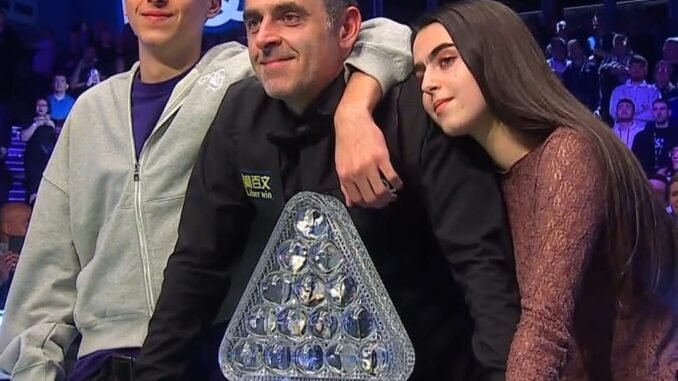
Ronnie O’Sullivan Hints He Will Miss 2026 Masters Amid Lifestyle Change and Global Commitments
Ronnie O’Sullivan has once again stunned the snooker world—not with a record-breaking break or a last-minute comeback, but with a candid admission about his future playing schedule. Speaking exclusively to talkSPORT Drive, the seven-time World Champion revealed he is unlikely to appear at the 2026 Masters in January, citing his move to Dubai and a decision to scale back his playing commitments.
“I probably won’t play the Masters this year,” O’Sullivan admitted, his words carrying the weight of inevitability. “I moved to Dubai, a lot of my work is in China and the Middle East so it made sense to be near. The jet lag was crucifying. It’s not that easy to just get on a plane and come back to the UK.”
The announcement, though not yet an absolute confirmation, suggests that the Masters—widely regarded as one of the sport’s most prestigious invitational events—will be without its biggest draw. For fans who have come to associate the Alexandra Palace stage with O’Sullivan’s flair, unpredictability, and genius, his absence will mark the end of an era.
A New Base in Dubai
O’Sullivan’s relocation to Dubai is not entirely surprising. Over the past decade, the snooker legend has increasingly divided his time between playing commitments and commercial ventures. His exhibitions in China routinely attract vast audiences, and his ambassadorial work across Asia has made him a global face of the game.
From a logistical perspective, moving to the United Arab Emirates positions him closer to the markets where much of his current work is based. “I was flying back and forth from the UK and it just wasn’t sustainable,” he explained. “You can only take so much of the constant jet lag. At some point, you have to look after your body and your sanity.”
This strategic move hints at a broader shift in O’Sullivan’s priorities. While snooker has been his life for more than 30 years, he now appears more interested in balance—choosing quality appearances and meaningful opportunities over an exhaustive calendar.
Scaling Back the Schedule
Throughout his career, O’Sullivan has never been afraid to take breaks or express dissatisfaction with the sport’s demanding tour schedule. At various points he has limited his participation to the events that inspire him, even at the cost of missing ranking points.
Now at 49, the physical and mental strain of constant travel is more acute. By stepping away from certain tournaments like the Masters, O’Sullivan is effectively tailoring his calendar to suit his lifestyle. “I still love playing,” he said, “but I don’t need to do it all the time. I’ll pick and choose where it makes sense.”
It’s a philosophy that has divided opinion among fans and pundits. Traditionalists argue that the Masters, alongside the World Championship and the UK Championship, forms part of snooker’s “Triple Crown” and should be non-negotiable. Others counter that O’Sullivan has more than earned the right to dictate his own terms, having delivered three decades of entertainment and success.
Impact on the Masters
Should O’Sullivan’s withdrawal become official, the Masters will lose not only its marquee attraction but also one of its most decorated champions. He has lifted the trophy a record seven times, dazzling London crowds with his artistry and unpredictability.
The tournament thrives on its unique format—16 of the best players battling in a non-ranking but high-prestige environment. Yet O’Sullivan’s absence would inevitably cast a shadow over the event. Organisers may look to rising stars or international favourites to fill the void, but few can replicate the magnetism of “The Rocket.”
For the players, however, it opens a door. Without O’Sullivan in the draw, others may see a clearer path to glory, potentially making the 2026 edition one of the most open Masters in years.
The Global Face of Snooker
O’Sullivan’s comments also underscore a broader truth: snooker is no longer a sport dominated by the UK. With booming popularity in China and increasing growth in the Middle East, the balance of power is shifting. By basing himself in Dubai, O’Sullivan places himself at the crossroads of this new snooker geography.
His presence in exhibitions, commentary, and ambassadorial roles will likely strengthen the sport’s profile across these regions, even if it means British fans see less of him in competitive action.
What’s Next for The Rocket?
While fans may be disappointed at the prospect of a Masters without O’Sullivan, it seems clear that he is not walking away from the sport altogether. Instead, he is redefining his involvement. Select tournaments, international exhibitions, television work, and even writing projects are all on his radar.
In many ways, O’Sullivan’s latest decision reflects the arc of a veteran champion who has given everything to the game. He remains competitive at the highest level but now plays on his own terms. Whether or not he appears at the Masters, his influence will continue to shape snooker’s future.
As one fan remarked online following the interview: “If Ronnie’s not at Ally Pally, it won’t be the same. But he’s earned the right to do what’s best for him.”
For the Masters, it may be a loss. For O’Sullivan, it may be the next logical step in a career defined as much by independence as by brilliance.
Leave a Reply